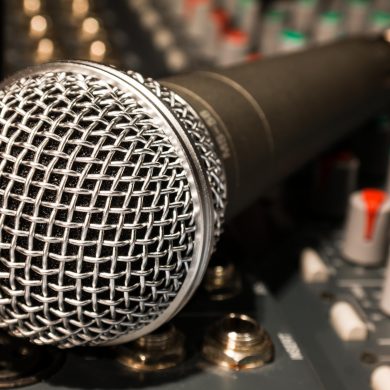Have you ever wondered why you sometimes start yawning when you sing? Are you bored, or does singing make you tired, or is there some other reason for this?
If you find that singing makes you yawn, chances are that your body is trying to replace the oxygen that you are burning up while singing. You use a lot more oxygen when singing. Sometimes, yawning is also the result of your body getting confused because your mouth is open and it thinks that means you need to yawn.
In this article, we’re going to look at what makes you yawn when you’re singing and how you can stop this from happening so your songs don’t get interrupted by constant yawning.
Why Do I Yawn When I Sing?
There are a few reasons that singing is thought to trigger yawning, and it may be a combination of all of these or just one or two of them in play at any one time. Yawning whenever you try to sing can be very frustrating, so let’s find out the top reasons that this happens.
- Your body is trying to get more oxygen because you are using a lot of oxygen up while singing.
- Your open mouth and throat are confusing your brain and making it think that you are yawning, which triggers a need to yawn.
- Singing may change your brain temperature, warming it up, so you yawn to take in fresh oxygen and potentially cool your brain back downhill.
It should be noted that nobody knows which of these theories is true, but these are the most frequently suggested explanations for why singing tends to trigger yawns. Let’s look at each in more detail.
Reason 1: More Oxygen
It is thought that yawning is one way to get more oxygen into your body when the supply is depleted. Singing is a surprisingly major workout and uses a lot more energy and oxygen than most people realize. That means that you might not have enough oxygen in your body, which triggers a yawn.
When you yawn, your body takes in more oxygen by taking a particularly deep breath of air. This can quickly be supplied to the lungs and the muscles working to produce the song, which will make it easier to keep singing. Yawning is therefore a direct result of singing, in some cases, and may signify that you need to breathe more deeply.
This is particularly common in people who are just starting to learn to sing, possibly because their lungs have a lower capacity than a practiced singer’s might.
Reason 2: Confused Brain
In some cases, yawning while singing may simply be that the motion is confusing your brain. When you sing, you lift your soft palate and then depress your larynx. This is part of the same motion that you make when you yawn, and therefore you may trick your brain into thinking that’s what you are trying to do.
Your brain will then respond by triggering the rest of the yawn motion, producing a full yawn. You may not need the additional oxygen; your brain is just confused about what you are trying to do. Remember, the human brain isn’t infallible, so this isn’t a particularly strange thing to encounter.
Similarly, when you open your throat wide to produce strong notes, this mimics the yawning position and can have the same result. Doing the two together is even more likely to cause confusion.
This sort of yawning is likely to decrease if you begin singing regularly because your brain will start to learn what you are trying to do and will not get as confused.
Reason 3: Temperature Regulation
When you sing, you are exercising more muscles than you would expect, and this can increase the temperature of your brain. This is particularly true if you are standing in a hot practice room or under stage lights. Your brain will get warmer, and yawning may be your body’s solution to this.
Your body doesn’t want your brain to be too warm, so it responds by drawing in a fresh flow of cool oxygen from your surroundings. This fresh air will be cooler than the air in your body, so it will help to lower your body temperature and keep your brain cool. This will improve your cognitive functioning as well as supplying your body with more oxygen.
This is a common explanation for why we yawn in any situation, and it is thought to be particularly true for yawning while singing. However, further study is needed to prove the truth of this theory.
How Can I Stop Yawning When I Sing?
Yawning interrupts your song and is a very frustrating function because it is often involuntary and it can feel uncomfortable if you try to suppress it. Fortunately, there are a few things that you can do to decrease the chances of yawning, including the following:
- breathing exercises;
- relaxing your facial muscles;
- getting enough sleep; and
- breathing in and out quickly while singing.
Let’s explore each of these in more detail.
Tip 1: Breathing Exercises
Before you start singing, take a few minutes to do some deep breathing exercises. Sit up straight and draw a long, deep breath in. When your lungs are full of air, exhale slowly until they are empty again. Make sure you are breathing using your chest, rather than your stomach.
Doing this for a few minutes before you start practicing should help to ensure that you have plenty of oxygen in your body before you begin, and this should minimize the risk that you will start yawning. If you do have a yawning fit during a practice session, stop and do some more breathing exercises.
This should help to break the yawning up, convince your body that it has enough oxygen, and allow you to continue.
Tip 2: Relaxing Your Face
Remember that holding your throat and mouth muscles in certain positions can trigger yawning because these feel similar to the yawn position. This is something you cannot completely change, but you can reduce the risk of your body thinking you are trying to yawn by relaxing the muscles as much as possible.
Holding your jaw and throat too tightly will stop you from taking in air effectively and may prompt you to yawn. You should try to relax a little and not force your mouth or throat open so rigidly that they feel uncomfortable. Soften your muscles and you’ll find that you are more comfortable and you yawn less.
Some singing instructors will tell you to emulate a yawn when you start singing because the position for yawning is an excellent position for singing. Try not to get thrown off by this and avoid thinking about yawning by consciously latching onto another thought and sticking with it.
Tip 3: Getting Sufficient Sleep
Of course, yawning is often a sign that you are overtired and you haven’t slept enough. If you know you have singing practice or a performance the following day, prioritize getting good sleep to reduce the chances that you’ll need to yawn throughout the singing session.
It can be challenging to get enough sleep when you are thinking about getting enough sleep, but planning in advance should make this a little easier. For example, you should make sure you are ready for bed at a good time, and get your essential tasks done as early in the day as possible. Make your room restful and avoid screens in the later part of the day.
This should help you to nod off more easily, making you better rested for the following day and reducing the chances that you’ll need to yawn.
Tip 4: Breathing Quickly
When you are singing, try to make sure you are breathing in and out when you need to and not holding your breath. This can be difficult because you need to breathe when there is a break in the music, but make a conscious effort to use whatever breaks you can so your body doesn’t start signaling to your brain that it needs more oxygen.
Breathe in and out quickly, rather than slowly, when the song allows. You should find that you are less inclined to yawn and that you feel more comfortable throughout the singing practice.
It takes some practice to master the timing of breathing and singing, so don’t worry if you don’t get this right immediately. Simply make efforts not to breathe too slowly in between lines, and you should find that you are less inclined to yawn as a result. Focus on getting a quick breath in whenever the music allows you to so your brain has enough air.
Conclusion
There are thought to be several reasons why singing causes yawning, although nobody is yet entirely sure what the function of yawning is and why we do it. You can minimize yawning by doing breathing exercises first, staying relaxed while you sing, and making sure you take in sufficient air during the song.


